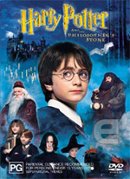
Harry Potter and the Sorcerer's Stone
See also:
Harry Potter: The Saga (Uncle Cliff)
Harry Potter and the Chamber of Secrets (Uncle Cliff)
Harry Potter and the Prisoner of Azkaban (Uncle Cliff)
Harry Potter and the Goblet of Fire (Uncle Cliff)
Harry Potter and the Order of the Phoenix (Uncle Cliff)
This film was my first foray to the Harry Potter universe, so I feel indebted to it to introducing to me the world that every kid, and their parents, on the planet had already discovered. I vaguely knew the name Harry Potter (this was pre-book shop days, of course) but in my head it somehow got mixed up with Beatrix Potter, and so I always kind of wondered what the big deal was about some books about some cute fluffy animals that did magic. Somehow I didn't notice any of the undoubtedly massive publicity campaign for the first film and it wasn't until the DVD came out and I put it on at the video store I worked in that I realised the error of my ways.
The first film struck me as being an absolutely brilliant realisation of a whole new world. The kind of dark children's tale that I hadn't seen since the Labyrinth / Neverending Story / Princess Bride /etc. type children's films of my own youth, since the safer-than-safe crap that was being churned out for kids since seemed to all be about talking cute fluffy animals, (some that may or may not have done magic).
I had never been able to get into any fantasy books. They all seemed blandly the same to me (why in fantasy , a genre which intrinsically follows no earthly rules, in which the authors can imagine ANYTHING they want, and are not bound by any restrictions of logic or reason, do all the stories sound frickin' identical?). Harry Potter doesn't throw you in some strange fantasy dimension where the Oracle of Osirisis has foreseen that the mystical Sword of Shamanshire has to be retrieved from the deathly swamps of the Dwarf city Midgettown and can only be used by the one true Warrior King of Men to draw blood from the tails of the sacred Dragons of Vangaäard Lake, which of course is the only known key to opening the magical gates of Myriian to save the beautiful Elf Princess of Cherryforrest Forrest from the wrath of Krondor, the Minotaur God.
Instead Harry Potter leads you into its fantastic world, which co-exists with our own. We discover the delights and quirks and mysteries as Harry does, as he finds out he is not an ordinary boy, but a wizard of great potential and is naturally whisked off to wizarding school. It is all a credit to Rowling of course that instead of sending Harry off to find the Sword of Shamanshire from the swamps of the Midgettown to slay the Dragons of Vangaäard Lake to use to open the gates to Myriian to save the Elf Princess of Cherryforrest Forrest, she instead sends him to school. There he learns about this magical world, and his true past, as he tries to piece together a mystery that could involve the evil wizard that killed his parents. It's a personal story all the way with Harry, and that's a large part of what makes the stories such a charm, and Rowling such a master of storytelling.
But onto the film.
I don't understand those who fault Columbus's direction here. Sure, he's not the most brilliantly exciting director and loves a few clichés too many and doesn't take any real great risks, but he gave this franchise exactly the kind of stable start it needed. A faithful adaptation that never shies away from the darkness of the book. His film really takes its time to create the world, a necessity really since those to follow would have to use its look and its rules as a template. Unlike it's successors, Philosopher's Stone (or Sorcerer's Stone for all the yanks who read this site) also delightfully gives you the feel of the entire school year at Hogwartz, whilst the other films, as the books got bigger and bigger, had to rush straight to the ‘important' points.
I think a lot of the fan hostility towards Columbus comes from him, and the production, being American, as fans no doubt see it as Hollywood hijacking a story with a distinctly British flavour. Whilst the film is undoubtedly Hollywood in terms of its size and scale, Columbus does keep things very British, and withstood pressure to hire an American cast for the film – as Spielberg apparently wanted to do when he was considering the project. (In an alternative reality we would have got Haley Joel Osment as Harry and probably Dakota Fanning as Ginny Weasley with Tom Cruise as Dumbeldore.)
The kids are great and it's obviously one of the great pleasures of this series of films that you can watch the kids not only mature in size, but as actors. They now are Harry, Hermione and Ron, and if they ever replace them the series will lose a great deal of its spark for me. The adult roles are cast perfectly, the highlight being Alan Rickman, who despite the fact he has been perpetually typecast as the villain, still seems to be enjoying himself as the sinister professor Snape.
The other films may be more exciting, more action-filled and become gradually edgier as the kids become more adult, but The Philosopher's Stone remains the best adaptation of Rowling's work, and my favourite Harry Potter film thus far.